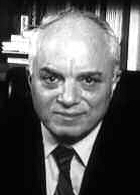Top Qs
Timeline
Chat
Perspective
Umberto Colombo (scientist)
Italian chemical engineer, academic and minister (1927–2006) From Wikipedia, the free encyclopedia
Remove ads
Umberto Colombo (1927 – 13 May 2006) was an Italian chemical engineer, academic and the minister of universities, science and technology of Italy.
Remove ads
Early life and education
Colombo was born in 1927.[1] He received a PhD in physical chemistry from the University of Pavia.[1][2] He was a Fulbright Fellow at the Massachusetts Institute of Technology in the United States.[2]
Career
Summarize
Perspective
Colombo trained as a chemical engineer [3] and worked as a professor at the University of Milan in the 1970s.[4] He served as the president of the Italian energy firm Eni for a short period from November 1982 to January 1983 [5] before being appointed as the head of the Italian nuclear energy unit.[6]
From 1993 to 1994 Colombo served as the minister of universities, science and technology in the Ciampi cabinet.[7][8] Following this he became a member of the Italian national council of economy and labour.[3] He was one of the shareholders of Energy Conversion Devices and became a member of its board of directors in July 1995 before retiring in November 2004.[9]
Other posts that Colombo held included the chairman of ENEA (Italian national agency for new technology, energy and the environment; 1983-1993), president of the European Science Foundation (1991-1993), chairman of the Italian hydrocarbons trust, director general of Montedision's R&D and strategic planning, director of Montecatini's G. Donegani research centre, governor of the international development research centre (IDRC; 1985-1990) in Canada, chairman of the United Nations's advisory committee on science and technology for development (1984-1986), chairman of LEAD-Europe,[10] and president of the European institute research management association.[1][2][7][9] He was also a member of the Club of Rome's executive committee that had been founded by Aurelio Peccei.[11]
Works
In 1989, Colombo and fellow Italian scientist Francesco Scaramuzzi experimented with nuclear fusion, reporting that they had successfully created nuclear fusion at room temperature.[12]
Awards
Colombo was the recipient of the Honda Foundation's award for ecotechnology in 1984.[1][13] He was also awarded China's state international scientific and technological cooperation award in 1999.[14]
Remove ads
Death
Colombo died in Rome on 13 May 2006, aged 78.[9]
References
External links
Wikiwand - on
Seamless Wikipedia browsing. On steroids.
Remove ads

